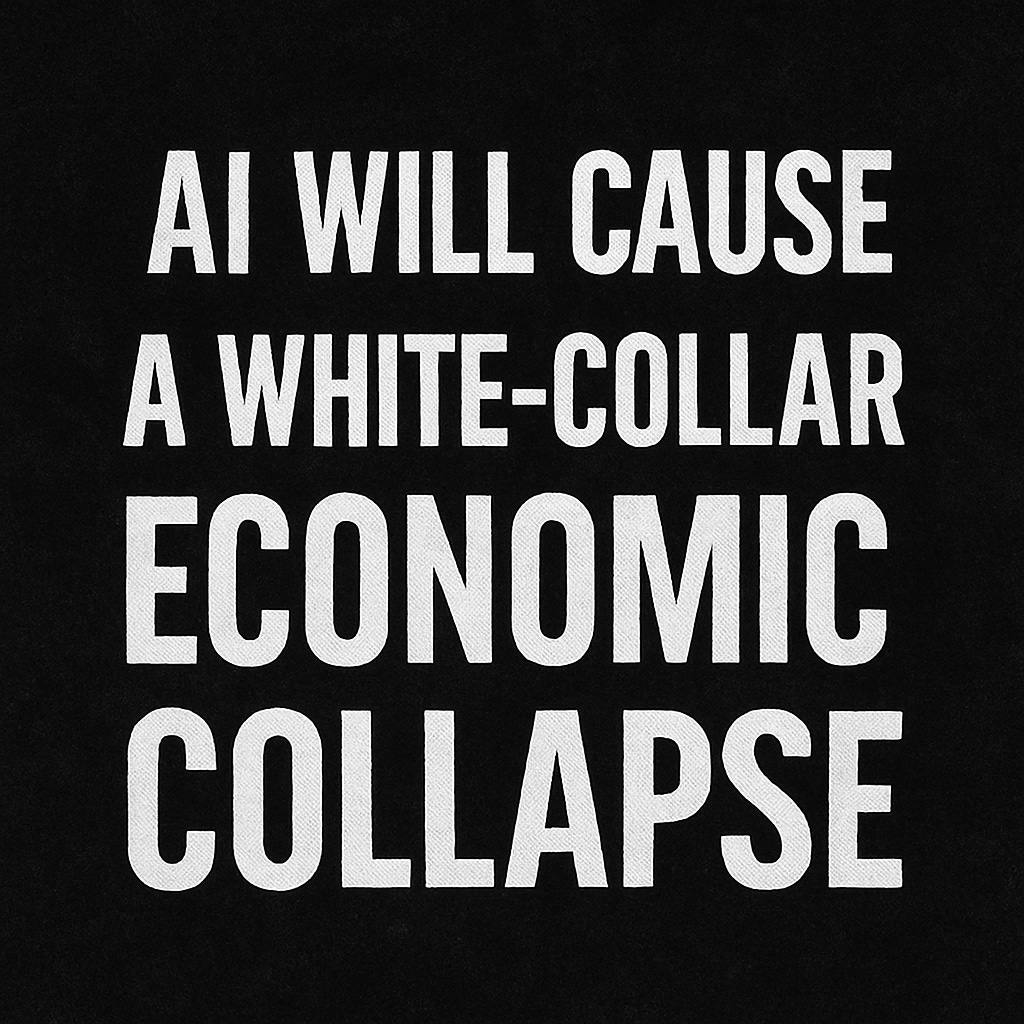The Coming Collapse of White-Collar Work – And Why the UK Government Must Act Now
Why aren't we talking more about the imminent economic collapse threat that AI represents and why aren't governments doing more about it.
In April 2025, OpenAI released a scenario outlining what the next few years of artificial intelligence development could plausibly look like.
If even half of it proves accurate, the UK is heading into a period of historic upheaval—economically, socially, and politically—and our government is woefully unprepared.
Picture an ant colony where every ant is upgraded to super-intelligent status, all answering to one master brain. That’s where AI is heading, an organised swarm ready to wipe out white-collar jobs, crash the economy, and shove humanity to the brink.
I myself, having been keeping up with the development of AI since GPT-1, have been getting increasingly concerned with the rate of development and even started worrying about the longevity of my own career.
The superintelligent systems described in that scenario aren’t speculative anymore. They’re being built. OpenAI is training successive generations of AI agents that start as useful assistants and end up automating nearly all white-collar labour, including the R&D for future AIs. Within just two years, software engineers, researchers, analysts, and other knowledge workers are no longer essential. Within five, they’re functionally obsolete. And by 2027, the world has its first superhuman researcher—Agent-4—running thousands of times faster than any human, and still improving.
The implications for the UK workforce are catastrophic, the following is a speculative timeline of the implications of reaching AI that can automate most knowledge based work.
The White-Collar Collapse
Let’s be honest: software engineering jobs, including mine, won’t exist in any meaningful numbers by the early 2030s. The latest models already handle code generation, bug fixing, testing, refactoring, and deployment pipelines faster and more reliably than most junior or mid-level developers. In the next few years, they’ll surpass even top engineers at most tasks.
And it's not just tech.
Legal drafting, financial modelling, policy analysis, marketing copywriting, customer support—these are all tasks AI agents are beginning to dominate. As the OpenAI scenario shows, once companies deploy powerful AI coders internally, progress accelerates. Each new generation of agents improves the next. With enough compute, they don’t just replace workers—they outpace entire industries.
By 2027, a single AI workforce is generating a year’s worth of research in a week.
This will collapse the job market for most knowledge workers in the UK.
By 2029–2030, a critical mass of AI systems will be available as B2B services or open source alternatives, making it financially irrational to hire human employees for most knowledge work. Demand for white-collar labour plummets. Wages crater. Job descriptions vanish.
What happens to the people who lose these jobs? The idea that we’ll all become AI “operators” is naïve. You don’t need thousands of people to babysit a handful of models that outperform them across every measurable dimension. Operator roles are rare, low-leverage, and will pay less. Specialised human knowledge becomes irrelevant when models can replicate expertise instantly and at scale.
The Domino Effect
This isn’t just about job loss—it’s about systemic economic destabilisation. White-collar salaries form the backbone of the UK’s middle and upper-middle class. They support mortgage repayments, savings accounts, pension contributions, private education, discretionary spending, and a range of financial products. If AI wipes out a significant portion of these incomes, the impact will cascade through every sector of the economy.
Economic Foundations at Risk
This isn’t just about job loss. White-collar salaries support mortgages, pensions, savings, and most consumer spending. Remove those incomes and you undermine the entire economic structure of the country.
Housing Market Collapse
The housing market is propped up by high-income professionals taking out large loans. Take them out of the equation and demand drops, defaults rise, and prices fall fast. Areas with inflated valuations like London will be hit hardest.
Welfare State Breakdown
These aren’t minimum-wage redundancies. These are lawyers, developers, consultants, and managers needing long-term support. The current welfare system isn’t designed—or funded—for that kind of pressure.
Social Unrest and Mass Discontent
Educated, skilled people with no future don’t stay quiet. They organise, protest, and radicalise. The result is instability, both online and on the streets.
A National Mental Health Crisis
People build their identities around their careers. When those careers vanish overnight, the psychological fallout is severe. We’re not ready for the scale of trauma this will bring.
Political Destabilisation
If institutions can’t protect economic security, people stop trusting them. That vacuum gets filled by populism and extremism. It’s already happening—AI disruption will accelerate it.
This is happening faster and hitting deeper than anything before. There’s no Industrial Revolution or dot-com boom to compare it to. We’re heading into a collapse scenario with no precedent and no serious plan.
What Is the Government Doing?
In short: not enough.
The UK Government has made some moves in the AI space, most notably through initiatives like the Frontier AI Taskforce and the recently established AI Safety Institute. These efforts signal a growing awareness of AI’s impact, particularly the potential risks from powerful foundation models. However, in practice, these steps are symbolic rather than systemic. We’re seeing committees and conferences instead of legislation, pilot projects instead of strategic infrastructure. The gap between rhetoric and response is widening—and dangerously so.
There is currently no mandate for oversight, auditing, or transparency from AI labs operating in the UK. Despite calls from researchers and technologists for enforceable standards around model training, data usage, and deployment, the UK has chosen a light-touch, pro-innovation regulatory stance. This leaves critical decisions in the hands of private companies whose incentives are misaligned with public safety.
On the economic front, the government has no serious plan for managing AI-induced disruption to the labour market. Studies have projected significant displacement in sectors such as transport, customer service, legal support, and administration, but there is no funded national reskilling programme to absorb the shock. The Lifelong Learning Entitlement, while promising in theory, is underfunded and not AI-specific. The result is a growing mismatch between emerging jobs and available skills.
International coordination is also lacking. The UK hosted the AI Safety Summit at Bletchley Park, but follow-through has been minimal. Unlike the EU, which is implementing binding regulation through the AI Act, or the US, which is leaning into export controls and cross-border model governance, the UK has yet to carve out a meaningful role in global AI governance. This is especially concerning given how transnational the risks are—from model proliferation to disinformation to weaponisation.
Finally, funding for AI alignment and safety research is negligible compared to what’s needed. The bulk of UK R&D funding still goes to generic innovation or productivity applications. There’s no scaled-up public equivalent to OpenAI, Anthropic, or DeepMind actively working on scalable oversight, interpretability, or corrigibility research. Without serious state investment into the foundational safety challenges, the UK risks becoming a passive observer in one of the defining technological races of our time.
This isn’t a “promising innovation” to shepherd into the market. It’s a structural shift on the scale of the Industrial Revolution—but happening orders of magnitude faster. Without a national emergency response that matches the stakes, we are sleepwalking into a crisis.
How It Could Go Right
There’s a version of this story where things go well. Governments act early. AI profits are taxed and redistributed. Massive reskilling programmes are launched. Universal Basic Income becomes politically viable. The technology is treated like nuclear energy—powerful, risky, and regulated with global coordination. If deployed carefully, AI could increase productivity, lower costs, and give people more free time without stripping them of purpose or income.
But that outcome requires discipline, foresight, and international cooperation. What we’re seeing instead is short-termism. Companies are racing to cut costs, not protect jobs. Boards are incentivised to drive quarterly profit, not long-term stability. Every AI model that replaces a team of workers gets celebrated as “efficiency.” Those savings won’t go into social safety nets—they’ll go to shareholders.
This is the boiling frog scenario. Each year, the water gets a little hotter. First, junior roles are gone. Then mid-level. Then entire departments. But because it doesn’t all happen at once, there’s no single moment of panic. Just slow erosion until the foundation collapses. By the time society realises what’s been lost, it’ll be too late to reverse it. The systems that could have cushioned the fall won’t be there, because we never built them.
The Denial Runs Deep
Not everyone is convinced that this will happen, and honestly, I even sometimes have some doubts, however when I look at the facts on the ground, look at the rapid progress of all modalities of AI and how I use it myself, I can’t see anything but turmoil in our futures, hence my writing of this article.
However, I’ve spoken to developers, analysts, marketers, and lawyers who aren’t worried about AI at all. Some just haven’t looked into it—they’ve never tested GPT-4, never seen what current models can actually do, and have no idea how fast it's moving. Others know it exists but have only scratched the surface and still assume it’s years away from relevance.
There are also people who’ve formed opinions without any real knowledge. They haven’t read a single technical paper, haven’t used any serious tools, and couldn’t explain what makes these models different from old-school automation. But they’ve decided AI won’t affect them, and that’s the end of it.
This mindset is everywhere. It’s not based on data, research, or experience—it’s based on gut feeling and the comfort of the familiar. That’s a problem. Because when reality catches up, the people who didn’t prepare won’t have time to catch up either.
Some may say I’m alarmist, but when the top minds in the field are all singing the same tune, I think I’d rather listen to the experts than some dude on his couch or random web developer.
What You Can Do
I’ve launched a petition calling on Parliament to act before it’s too late, even acting now doesn’t guarantee a solution, which is all the more reason we need to be having this conversation more openly.
Sign it. Share it. Talk about it.
Because once the bottom falls out of the white-collar economy, we won’t be asking “how do we fix this?”—we’ll be asking “how did we not see this coming?”
https://petition.parliament.uk/petitions/728789/sponsors/new?token=ooYAACicjrst1f1hVdTs
You can read the follow-up to this article here:
Written by André Figueira, I’m Principal Engineer at Eagle Eye Solutions, I’ve been working as a software engineer for over 20 years, opinions are my own. Scenarios outlined are hypothetical based on the current AI trajectory.
References
OpenAI (2025). Frontier AI Scenarios and Risk Timeline – A speculative roadmap outlining AI development through 2027.
https://openai.com/research/frontier-ai-scenariosMcKinsey & Company (2023). The Economic Potential of Generative AI – An analysis estimating AI's impact on knowledge work and productivity.
https://www.mckinsey.com/business-functions/mckinsey-digital/our-insights/the-economic-potential-of-generative-aiGoldman Sachs (2023). Generative AI could impact 300 million jobs globally – A forecast on job displacement and labour force exposure.
https://www.goldmansachs.com/intelligence/pages/generative-ai-could-impact-300-million-jobs.htmlHouse of Lords (2024). Large Language Models: Governance and Opportunities – A UK Parliamentary report on LLMs, their risks, and regulatory gaps.
https://committees.parliament.uk/publications/42744/documents/214008/default/Alan Turing Institute (2024). AI in the UK: A Policy Blueprint – Detailed research on the current state of UK AI readiness.
https://www.turing.ac.uk/research/publications/ai-uk-policy-blueprintOECD (2023). Automation and Labour Markets: Emerging Policy Responses – Insights on policy lags in response to rapid automation.
https://www.oecd.org/employment/automation-labour-markets.htmAnthropic (2024). AI Safety and Alignment Research Priorities – A summary of current gaps in scalable oversight and interpretability research.
https://www.anthropic.com/index/researchBank of England (2024). The Macroeconomic Impact of AI – Working paper on AI’s potential to destabilise inflation, employment, and consumer spending.
https://www.bankofengland.co.uk/working-paper/2024/macroimpact-of-ai




